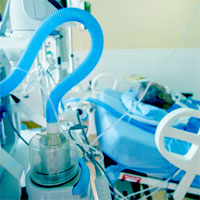Tag: mechanical ventilation
Effects of Early Mobilization on the Prognosis of Critically Ill Patients
Early mobilization was effective in enhancing the recovery of critically ill patients, but more large-scale, multicenter randomized controlled trials are required to further confirm these findings. A total of 39 articles... read more

Personalized Mechanical Ventilation in ARDS
A personalized mechanical ventilation approach for patients with adult respiratory distress syndrome (ARDS) based on lung physiology and morphology, ARDS etiology, lung imaging, and biological phenotypes may improve ventilation... read more

Effect of Graded Early Mobilization on Psychomotor Status and Length of ICU Stay in Mechanically Ventilated Patients
This research showed that graded early mobilization was highly effective to improve the motor and psychological status of mechanically ventilated patients and reduce their length of ICU stay. In the control group mean... read more

Prone Positioning and Survival in Mechanically Ventilated Patients with COVID-19
In-hospital mortality was lower in mechanically ventilated hypoxemic patients with coronavirus disease 2019 treated with early proning compared with patients whose treatment did not include early proning. Among 2,338 eligible... read more

A Rational Approach on the use of ECMO in Severe Hypoxemia
Veno-venous extracorporeal membrane oxygenation (ECMO) is a helpful intervention in patients with severe refractory hypoxemia either because mechanical ventilation cannot ensure adequate oxygenation or because lung protective... read more

Oxygen Therapy in COVID-19 Patients: The Role of HFNC and CPAP
Oxygen therapy and non-invasive ventilation in COVID-19 should be based on pathophysiological changes and a step-by-step approach should be adopted in choosing the right therapeutic strategy for each patient. Continuous... read more

Clinical Trials Design Evaluating Sedation in Critically Ill Adults Requiring Mechanical Ventilation
These recommendations are intended to assist researchers in the design, conduct, selection of endpoints, and reporting of clinical trials involving sedative medications and/or sedation protocols for adult ICU patients who... read more

Percutaneous Dilational Tracheostomy for COVID-19 Patients Requiring Mechanical Ventilation
Patients with COVID-19 who survive the early days of MV experience severe and prolonged respiratory failure. An early modified percutaneous dilational tracheostomy (PDT) was safe for patients and healthcare providers and... read more

RRT in Critically Ill Patients with AKI
Recent evidence has shown that pre-emptive or earlier renal-replacement therapy (RRT) in patients with severe acute kidney injury (AKI) and no urgent indications does not confer clinical benefit. By default, this would imply... read more

The Relationship of Delirium, Sedation, Dementia, and Acquired Weakness
The advent of modern critical care medicine has revolutionized care of the critically ill patient in the last 50 years. The Society of Critical Care Medicine (was formed in recognition of the challenges and need for specialized... read more

Evolving Changes in Mortality of Critically Ill with COVID-19 Over 8 Months
Age and mortality rates have declined over the first 8 months of the pandemic. The use of non-invasive respiratory support (NIRS) as the first respiratory support measure was associated with survival, but causal inference... read more

Tocilizumab Use May Be Associated with a Short-term Mortality Benefit
For hospitalized COVID-19 patients, there is some evidence that tocilizumab use may be associated with a short-term mortality benefit, but further high-quality data are required. Its benefits may also lie in reducing the... read more

The Predictive Role of Combined Cardiac and Lung Ultrasound in COVID-19
In hospitalized patients with coronavirus disease 2019, a very limited echocardiographic examination is sufficient for outcome prediction. The addition of echocardiography in patients with high-risk MEWS decreases the rate... read more

NIV After Early Extubation Reduces Total Days Spent on i-MV
Patients recovering from an episode of hypoxemic acute respiratory failure (hARF) may benefit from a weaning strategy based on early extubation followed by immediate noninvasive ventilation (NIV) application. Compared... read more

Risk of Clinical Severity by Age and Race/Ethnicity Among Adults Hospitalized for COVID-19
Older adults and people from certain racial and ethnic groups are disproportionately represented in coronavirus disease 2019 (COVID-19) hospitalizations and deaths. Using data from the Premier Healthcare Database on 181,813... read more

Clinical strategies for implementing lung and diaphragm-protective ventilation
Mechanical ventilation may have adverse effects on both the lung and the diaphragm. Injury to the lung is mediated by excessive mechanical stress and strain, whereas the diaphragm develops atrophy as a consequence of low... read more

Sedation, Analgesia, and Paralysis in COVID-19 Patients in the Setting of Drug Shortages
The rapid spread of the severe acute respiratory syndrome coronavirus-2 (SARS-CoV-2) has led to a global pandemic. The 2019 coronavirus disease (COVID-19) presents with a spectrum of symptoms ranging from mild to critical... read more

A Retrospective Cohort Study of 12,306 Pediatric COVID-19 Patients in the United States
Children and adolescents account for ~ 13% of total COVID-19 cases in the United States. However, little is known about the nature of the illness in children. The reopening of schools underlines the importance of understanding... read more

COVID-19: Dual Oxygen Concentrator System for Mechanical Ventilation
Sabah in Malaysian Borneo is among the Malaysian states which reported a high number of detected COVID-19 cases during the current pandemic. Due to geographical challenges and limited resources, clinicians developed novel... read more

Undercover Epicenter Nurse: How Fraud, Negligence, and Greed Led to Unnecessary Deaths at Elmhurst Hospital
What would you do if you discovered that the media and the government were lying to us all? And that hundreds, maybe thousands of people were dying because of it? Army combat veteran and registered nurse Erin Olszewski’s... read more

Promoting Evidence-Based Practice in ARDS
There is a dearth of literature addressing interventions to improve implementation of evidence-based practices in acute respiratory distress syndrome (ARDS). Existing interventions to improve clinician knowledge and facilitate... read more

Remestemcel-L reduces ARDS mortality in those under 65 years old
New data shows patients with COVID-19-related Acute Respiratory Distress Syndrome (ARDS) were up to 75 percent less likely to die when treated with remestemcel-L and dexamethasone. The data shows remestemcel-L reduced... read more










